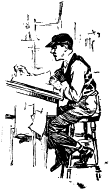None for me, thanks.
Dear Word Detective: What is the origin and current use of the word “scribner”? A Canadian coworker says the Canadians use this word like we do “scribe” although it has an expanded meaning of not only taking notes, but watchdogging all paperwork for a project or committee. Do you concur? Was it originally British? — Kathleen.
Hey, this is cool. I finally get to try out my Canadian dictionary. Seriously. I’ve had The Canadian Oxford Dictionary (“The foremost authority on Canadian English”), all 1700 pages of it, sitting on my shelf for almost ten years, where it has collected a formidable layer of dust. I can’t really claim any foresight on this score, however, because Oxford University Press sends me pretty much every dictionary they publish, which may explain why the floor of my office tilts so alarmingly.
Hmm, the book seems to be stuck to the shelf. I must have a word with the housekeeper as soon as I hire one. Here we go, “Scriabin,” “scribbler,” “scribe,” “scrim.” Oops, no “scribner.” Let’s give Google a shot. Nope, lots of references to Charles Scribner’s Sons, the famed American publisher, as well as “Scribner” as a common surname, but no “scribner” in the sense you mention. The Oxford English Dictionary also comes up blank.
 It’s certainly possible that your Canadian friend is correct about “scribner” being used as described, but at this point I’m wondering if he or she might have misheard the word “scrivener” as “scribner.” A “scrivener” originally was (the profession being long obsolete) a copyist, a clerk who copied legal documents in longhand before the widespread advent of printing. The most famous (and disturbing) example of this breed is no doubt Bartleby the Scrivener, the subject of of Herman Melville’s short story, whose catch-phrase “I would prefer not to” has resonated with office workers since the story’s publication in 1853. Incidentally, there has been a case made that what ailed Bartleby was Asperger’s syndrome, a form of autism.
It’s certainly possible that your Canadian friend is correct about “scribner” being used as described, but at this point I’m wondering if he or she might have misheard the word “scrivener” as “scribner.” A “scrivener” originally was (the profession being long obsolete) a copyist, a clerk who copied legal documents in longhand before the widespread advent of printing. The most famous (and disturbing) example of this breed is no doubt Bartleby the Scrivener, the subject of of Herman Melville’s short story, whose catch-phrase “I would prefer not to” has resonated with office workers since the story’s publication in 1853. Incidentally, there has been a case made that what ailed Bartleby was Asperger’s syndrome, a form of autism.
In modern use, “scrivener” (from the Old French “escrivain,” a notary or clerk,” based on the Latin “scribere,” to write,” also the source of “scribe”) is used to mean a clerk, assistant, or “amanuensis,” a lovely word originally meaning “one who takes dictation by hand” (from the Latin “servus a manu,” literally “servant from the hand”). It seems plausible that “scrivener” could be used to mean “someone in charge of the paperwork,” and, given that the word is not commonly heard, the substitution of the simpler form “scribner” seems almost inevitable.
“Amanuensis,” by the way, has also taken on the broader sense of “literary assistant,” especially to a writer. My father, who as a young man worked as a personal assistant for the journalist, essayist and lexicographer H.L. Mencken, took great pride in being introduced by Mencken as “my amanuensis.”




Leave a Reply